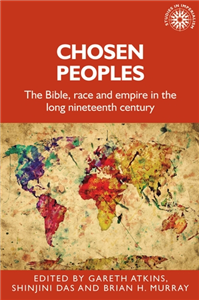Chosen peoples
The Bible, race and empire in the long nineteenth century
by Gareth Atkins, Shinjini Das, Brian Murray
Description
More Information
Rights Information
Albania, Algeria, Angola, Argentina, Armenia, Australia, Austria, Bahrain, Belgium, Belize, Benin, Bolivia, Bosnia and Herzegovina, Botswana, Brazil, Bulgaria, Burkina Faso, Burundi, Cameroon, Canada, Cape Verde, Central African Republic, Chad, Chile, China, Colombia, Comoros, Congo [DRC], Congo, Republic of the, Costa Rica, Ivory Coast, Croatia, Czech Republic, Denmark, Djibouti, Ecuador, Egypt, El Salvador, Equatorial Guinea, Eritrea, Estonia, Ethiopia, Faroe Islands, Finland, France, French Guiana, Gabon, Gambia, Georgia, Germany, Ghana, Greece, Guatemala, Guinea, Guinea-Bissau, Guyana, Honduras, Hongkong, Hungary, Iceland, India, Indonesia, Iran, Iraq, Ireland, Israel, Italy, Japan, Jordan, Kazakhstan, Kenya, Kuwait, Latvia, Lebanon, Lesotho, Liberia, Libya, Lithuania, Luxembourg, Macau, China, Macedonia [FYROM], Madagascar, Malawi, Malaysia, Mali, Malta, Mauritania, Mauritius, Mayotte, Mexico, Mongolia, Montenegro, Morocco, Mozambique, Namibia, Netherlands, New Zealand, Nicaragua, Niger, Nigeria, Norway, Oman, Pakistan, Panama, Paraguay, Peru, Philippines, Poland, Portugal, Puerto Rico, Qatar, Reunion, Romania, Russia, Rwanda, Saint Helena, Sao Tome and Principe, Saudi Arabia, Senegal, Serbia, Seychelles, Sierra Leone, Singapore, Slovakia, Slovenia, Somalia, South Africa, South Korea, Spain, Sri Lanka, Sudan, Suriname, Swaziland, Sweden, Switzerland, Syria, Taiwan, Tanzania, Thailand, Timor-Leste, Togo, Tokelau, Tunisia, Turkey, Uganda, Ukraine, United Arab Emirates, United Kingdom, United States, Uruguay, Venezuela, Vietnam, Western Sahara, Yemen, Zambia, Zimbabwe, South Sudan, Cyprus, Palestine, Bangladesh, Cambodia, Liechtenstein, Azerbaijan
Endorsements
Chosen peoples demonstrates how biblical themes, ideas and metaphors shaped narratives of racial, national and imperial identity in the long nineteenth century. Even and indeed especially amid spreading secularism, the development of professionalised science and the proclamation of 'modernity', biblical notions of lineage, descent and inheritance continued to inform understandings of race, nation and character at every level from the popular to the academic. Although new ideas and discoveries were challenging the historicity of the Bible, even markedly secular thinkers chose to explain their complex and radical ideas through biblical analogy. Denizens of the seething industrial cities of America and Europe championed or criticized them as New Jerusalems and Modern Babylons, while modern nation states were contrasted with or likened to Egypt, Greece and Israel. Imperial expansion prompted people to draw scriptural parallels, as European settler movements portrayed 'new' territories across the seas as lands of Canaan. Yet such language did not just travel in one direction. If many colonised and conquered peoples resisted the imposition of biblical narratives, they also appropriated biblical tropes to their own ends. These original case-studies, by emerging and established scholars, throw new light on familiar areas such as slavery, colonialism and the missionary project, while opening up exciting cross-comparisons between race, identity and the politics of biblical translation and interpretation in South Africa, Egypt, Australia, America and Ireland. The book will be essential reading for academic, graduate and undergraduate readers in empire, race and global religion in the long nineteenth century.
Reviews
Chosen peoples demonstrates how biblical themes, ideas and metaphors shaped narratives of racial, national and imperial identity in the long nineteenth century. Even and indeed especially amid spreading secularism, the development of professionalised science and the proclamation of 'modernity', biblical notions of lineage, descent and inheritance continued to inform understandings of race, nation and character at every level from the popular to the academic. Although new ideas and discoveries were challenging the historicity of the Bible, even markedly secular thinkers chose to explain their complex and radical ideas through biblical analogy. Denizens of the seething industrial cities of America and Europe championed or criticized them as New Jerusalems and Modern Babylons, while modern nation states were contrasted with or likened to Egypt, Greece and Israel. Imperial expansion prompted people to draw scriptural parallels, as European settler movements portrayed 'new' territories across the seas as lands of Canaan. Yet such language did not just travel in one direction. If many colonised and conquered peoples resisted the imposition of biblical narratives, they also appropriated biblical tropes to their own ends. These original case-studies, by emerging and established scholars, throw new light on familiar areas such as slavery, colonialism and the missionary project, while opening up exciting cross-comparisons between race, identity and the politics of biblical translation and interpretation in South Africa, Egypt, Australia, America and Ireland. The book will be essential reading for academic, graduate and undergraduate readers in empire, race and global religion in the long nineteenth century.
Author Biography
Gareth Atkins is Fellow and Director of Studies in History at Queens' College, Cambridge Shinjini Das is a Lecturer in Modern Extra-European History at the University of East Anglia Brian Murray is Lecturer in Nineteenth-Century Literature at King's College London
Manchester University Press
Manchester University Press is a leading UK publisher known for excellent research in the humanities and social sciences.
View all titlesBibliographic Information
- Publisher Manchester University Press
- Publication Date September 2021
- Orginal LanguageEnglish
- ISBN/Identifier 9781526160201 / 152616020X
- Publication Country or regionUnited Kingdom
- FormatPrint PDF
- Pages240
- ReadershipGeneral/trade
- Publish StatusPublished
- Dimensions234 X 156 mm
- Biblio NotesDerived from Proprietary 5001
- SeriesStudies in Imperialism
- Reference Code14277
Manchester University Press has chosen to review this offer before it proceeds.
You will receive an email update that will bring you back to complete the process.
You can also check the status in the My Offers area

Please wait while the payment is being prepared.
Do not close this window.



